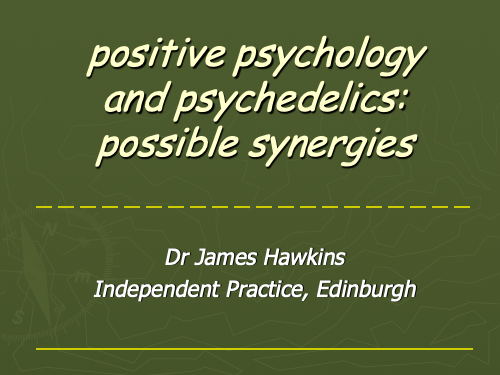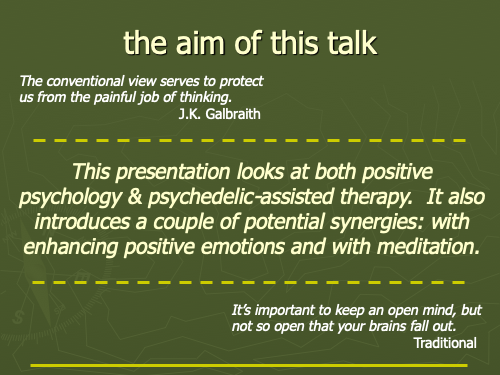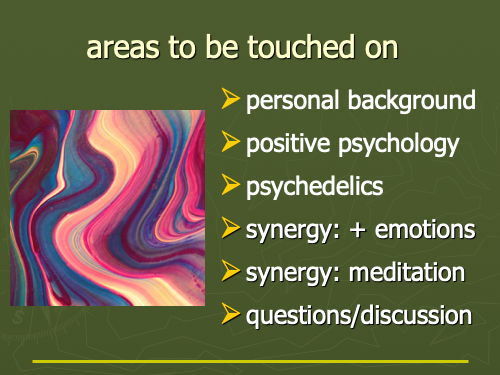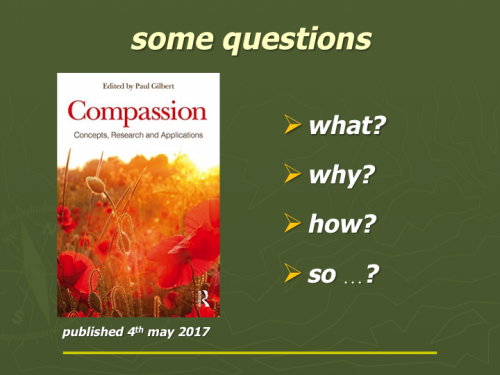Great to have lots of effective choices in our stress management toolbox!
Last updated on 5th June 2025
It's great to have a wide variety of effective choices in our stress management toolbox!

It's great to have a wide variety of effective choices in our stress management toolbox!
“Life is an endless unfolding, and if we wish it to be, an endless process of self-discovery, an endless and unpredictable dialogue between our own potentialities and the life situations in which we find ourselves. By potentialities I mean not just intellectual gifts but the full range of one’s capacities for learning, sensing, wondering, understanding, loving and aspiring.
” - John Gardner
Description ...
I gave a talk today about Positive Psychology and suggested a couple of areas where there could be helpful synergies with psychedelics. Here is the full downloadable talk and below are a few of the slides ... initially just below are the first three:



“Courage is not simply one of the virtues but the form of every virtue at the testing point.” C. S. Lewis
“Fear is the mind-killer … I will face my fear. I will permit it to pass over me and through me. And when it has gone past I will turn the inner eye to see its path. Where fear has gone there will be nothing. Only I will remain.” Bene Gesserit ‘Litany against Fear’ from Dune by Frank Herbert
[Sadly this potential skydiving adventure was cancelled ... for the second time ... because of poor weather conditions. I'll book again ... hopefully third time lucky. I'll then aim to complete this blog post!]
Yesterday was the first full day of the two & a half day (plus one day of pre-conference workshops) BABCP summer conference in Glasgow. It feels like I've been going to these annual BABCP get-togethers for a thousand years. In so many ways, I think they're great ... although, for a society that prides itself on being evidence-based (more on this later in this post), I do think that the way these conferences are delivered is pretty dusty & traditional. Basically we sit in large tiered lecture halls and listen to major plenary lectures or we sit in smaller rooms for workshops that are very largely just lectures in more extended formats.
A good friend & I have just been sorting out the practical details of running an 8 week course together on "Compassion, wisdom & wellbeing", starting in January. Some aspects still need to be tweaked, but the basic publicity information runs like this:
"If you want others to be happy, practise compassion. If you want to be happy, practise compassion." Dalai Lama
"Wisdom, compassion, & courage are the three universally recognized moral qualities of men." Confucius
“ Happiness is a kind of gratitude; it is not how much we have, but how much we enjoy what we have that really counts. ” - E. Edwards
This chapter will aim to look at the work of a variety of researchers including Dunbar, Gilbert, Neff, Crocker & Fredrickson ... and developing compassion.
I'm due to give a short lecture tomorrow on "Compassion". Here is a downloadable copy of the slides ... sadly with most of the images removed for copyright reasons. The event is a "Collider session". It's a kind of upmarket brainstorming exercise with an invited group of participants to look at how compassionate ideas & interventions might be helpfully introduced when the new Edinburgh university student intake arrives this autumn. I'm being wheeled on to give a brief introductory overview.
Useful to have Paul Gilbert's very recently published book to refer to:

Touch can be profoundly soothing and settling. In an intriguing study - "Nonverbal channel use in communication of emotion: how may depend on why" - researchers found that when participants generated displays of eleven different emotions, touch was the most preferred nonverbal way of showing love and sympathy. Welcomed touch can be very good for us physically, so we know touch settles stress hormones - "Social touch modulates endogenous mu-opioid system activity in humans" ( ), and can even reduce vulnerability to infections - see "Does hugging provide stress-buffering social support? A study of susceptibility to upper respiratory infection and illness".
I'm just back from a five day Mindful Self-Compassion (MSC) retreat in Iceland with Chris Germer & Christine Brahler. MSC teaches a whole host of meditation practices, with three underlined as core meditations. These three are Affectionate Breathing, Loving-Kindness for Ourselves, and Giving & Receiving Compassion. In this post I talk a bit more about the initial core meditation practice - Affectionate Breathing.